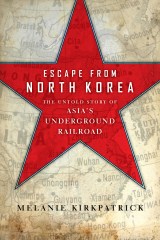A Military Demarcation Line still separates North Korea from South Korea, nearly 60 years after an armistice ended active hostilities.
North Korea remains a bleak place, and Melanie Kirkpatrick’s new book, Escape from North Korea: The Untold Story of Asia’s Underground Railroad, helps explain why. A nuclear-armed family communist dictatorship – who knew the communists were dynastic? – holds power by brute force. Its 24 million unfortunate citizens have endured more than a half-century of repression and deprivation. On Wednesday, following consultations with South Korean defense minister Kim Kwan-jin, Defense Secretary Leon Panetta said “North Korea remains a serious threat to both of our nations and a serious threat to regional and global stability.”
But Kirkpatrick, a former Wall Street Journal editorial writer now with the Hudson Institute, offers a glimmer of hope. She detects it among the increasing number of North Koreans who have committed a crime by escaping their national gulag. Just as they flow out, news of the outside world increasingly is flowing in. Kirkpatrick isn’t foolish enough to predict the regime’s imminent collapse. But she thinks it could happen – especially with more U.S. help, which she views as a moral obligation. She conducted this email chat with Battleland earlier this week:
Why did you write Escape From North Korea: The Untold Story of Asia’s Underground Railroad?
The stories of North Koreans who seek freedom and of the Christians who help them captured my heart, and I believed they deserved a wider audience.
Sixty years of oppression haven’t killed North Koreans’ desire for freedom. These are inspiring stories and they portend a more hopeful future for North Korea.
Also, the plight of the tens of thousands of North Korean refugees hiding in China is very little known. North Korea is the world’s worst abuser of human rights, but by its policy of repatriation China is a facilitator. Many of the people China returns don’t survive their stints in North Korea’s awful prisons, where food is scarce and torture and overwork are commonplace.
We’ve been hearing about North Korea – the Hermit Kingdom – for years. What does Escape from North Korea tell us that’s new?
Escape from North Korea is the first book to relate the stories of North Koreans who dare to escape and how they do it. These are gripping tales – involving women who are sold as brides in China, defectors carrying state secrets, and Christian rescuers, often Americans, who risk everything to help the people they regard as their North Korean brothers and sisters.

Encounter Books
To give two quick examples: I write about a North Korean pianist who fled because he was about to be arrested for the crime of playing jazz, and I tell the story of a retired Christian couple from the Midwest who runs a string of foster homes in China to care for North Korean children.
The impact of these escapees is huge.
First, they are educating the world about the truth of life in North Korea for ordinary people. Even more important, they are getting information about the outside world back into North Korea.
You can’t send an email to North Korea, or make a phone call, or even send a letter.
In Escape from North Korea, I describe how North Korean exiles have created a black market in information – how they use clandestine means to get news to their information-starved countrymen.
How much change is likely under the new North Korean leader, Kim Jong Un? How different is he from his father and grandfather?
I’m skeptical that Kim Jong Un is different or that much change is coming. Like his father and grandfather, like every dictator, Kim Jong Un fears change, which has the potential to loosen the regime’s grip on it people.
We already can see that in his early actions, which belie his rhetoric about improving the lives of his people. One of the first things he did after the death of Kim Jong Il last December was to issue a shoot-to-kill order to border guards to keep North Koreans from crossing to China.
There are also reports that that he is forcibly relocating families of people who’ve escaped to interior locations where they can no longer receive information from their relatives in China or South Korea.
Like his father and grandfather, Kim Jong Un is savvy about appealing to international audiences. The photographs of his wife over the summer were aimed at humanizing him and making him seem “normal.” I kept thinking about all the North Korean women who are sold as brides to Chinese men or trafficked into the sex industry in China.
How tough is life in North Korea today, compared to the famine years nearly 20 years ago?
There are severe food shortages in North Korea today, and widespread reports of hunger and malnutrition. It’s possible that people could die this winter, especially if the weather is severe. About one-tenth of the population died in the famine of the 1990s.
One result of the famine is that North Koreans today are more skeptical of their government’s ability or desire to take care of them. More people understand that the Kim regime uses food as a means of control.
People also seem less passive. There is no organized dissent in North Korea today, but I can imagine a scenario in which that could happen as North Koreans learn more about the opportunities available in the rest of the world.
Do you think the North Korea regime will come to an end in our lifetimes? If so, how? When?
Over the past 15 years, many people have made predictions of imminent collapse that have proved to be wrong, and I’d be foolish to do so here.
But I do think something very important is happening. The information invasion led by the North Korean escapees is already having an effect in North Korea.
Imagine, for example, the impact that a DVD of a South Korean soap opera has. Viewers see how South Koreans live. There’s food on the tables. There are family photos on the walls, not the portraits of Kim Il Sung and Kim Jong Il that are mandatory in every North Korean home.
North Koreans have to be asking: Why don’t we have the same lifestyles, the same freedoms?

Melanie Kirkpatrick
Why don’t North Koreans throw off the yoke of their oppressors?
One reason is that North Koreans are just beginning to understand that they live in the world’s most repressive country.
It’s only recently that they’ve learned about the prosperity and relative freedoms available in China, for example. Or that South Korea is now one of the world’s largest economies and has one of the freest political systems. East Asia has grown up around North Korea.
The Kim Family regime clearly fears that the North Korean people will rise up. At the time of the Libyan uprising last fall, Kim Jong Il refused to let North Koreans who were working in Libya go home. He was afraid that they would spread the news and encourage North Koreans to follow the Libyan example.
Another reason is the extreme brutality of the dictatorship. A person who commits a political crime – listening to a foreign radio broadcast, using an illegal cell phone brought in from China – knows that if he’s caught, his entire family will suffer. The regime practices a policy of collective punishment unto three generations. An offender’s parents and his children go to prison with him.
Why do you argue the U.S. and other nations should do more to free North Koreans from their misery?
Above all, it’s the moral thing to do.
Beyond that, the collapse of the Kim regime is in our national interest. I’d add that it is also in the interest of North Korea’s benefactor, China, which surely does not want a failed state on its border, especially one that is nuclear-armed.
The U.S., South Korea and Japan need to do more to persuade the Chinese leadership that a Korea unified under South Korea’s system of economic and political freedom would be a boon, not a threat.


